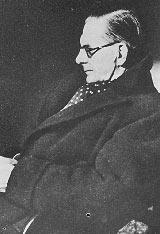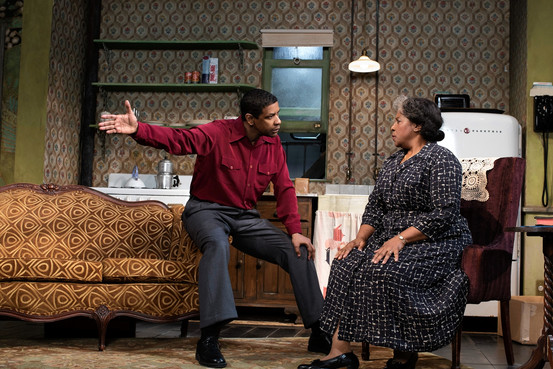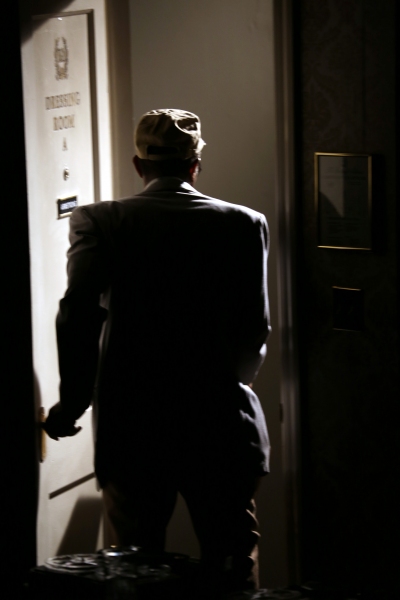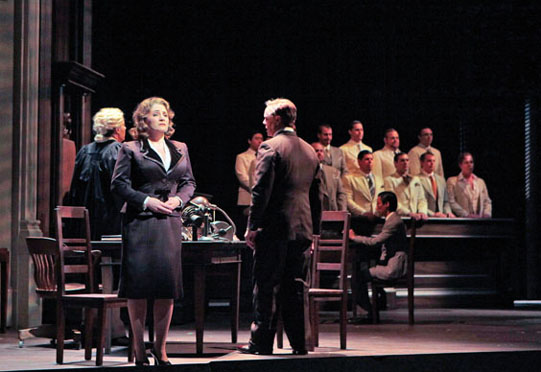“Music exists only in the moment of its performance, for if one were ever so skillful in reading notes and had ever so lively an imagination, it cannot be denied that it is only in an unreal sense that music exists when it is read. It really exists only being performed. This might seem to be an imperfection in this art as compared with the others whose productions remain, because they have their existence in the sensuous. Yet this is not so. It is rather a proof of the fact that music is a higher, or more spiritual art.”
Søren Kierkegaard, Either/Or
Surprise, surprise!
This is the other difficult season, the time of year when every drama critic in New York is complaining about having to see too much stuff in too short a span of time. I saw three shows on consecutive days last weekend, and I’ll be going to and writing about nine Broadway shows and one off-Broadway show between now and the April 23, after which I take a train to Washington, D.C., and start my summer theater travels.
 My job, of course, is to keep all of those plays and musicals straight in my head, if only for long enough to write my reviews. And it is, as I have regular occasion to say, a great job, the best one I know. But forced consumption, even of the finest art, is bad for the soul–and forced consumption of fair-to-middling art, which is what you often get on Broadway, wreaks even more psychic havoc. Years ago, when I was covering music for the Kansas City Star, I reviewed so many fair-to-middling classical concerts that something happened to me that I’d previously thought impossible: I burned out. After I gave up that line of work and moved to another city, two full years went by before I voluntarily went to another public performance of classical music.
My job, of course, is to keep all of those plays and musicals straight in my head, if only for long enough to write my reviews. And it is, as I have regular occasion to say, a great job, the best one I know. But forced consumption, even of the finest art, is bad for the soul–and forced consumption of fair-to-middling art, which is what you often get on Broadway, wreaks even more psychic havoc. Years ago, when I was covering music for the Kansas City Star, I reviewed so many fair-to-middling classical concerts that something happened to me that I’d previously thought impossible: I burned out. After I gave up that line of work and moved to another city, two full years went by before I voluntarily went to another public performance of classical music.
From then on I deliberately diversified my critical life, and the problem of burnout vanished, never again to recur. I did much the same thing a year or so after becoming the drama critic of The Wall Street Journal in 2003: I started getting out of town and reviewing regional theater. The Journal expects me to cover all Broadway openings, but otherwise I’m on my own, meaning that I pick the shows I see. That keeps me fresh–except in April, when I’m tied to the Broadway tracks.
Even then, my lot is infinitely more tolerable than that of a movie critic. I used to write a monthly column about film for Crisis, but I shut it down nine years ago. One of the reasons why I gave it up was that I’d gotten too busy doing other things, but another, equally compelling reason was that I’d discovered that new American movies no longer interested me other than occasionally. As I wrote in my valedictory column:
What makes me especially sad is that the first few years of this column (which I started writing in 1998) were a wonderful time for film in America, a time that now seems to have passed….I find myself less interested in writing about film, not because my love for the medium has diminished but because American filmmakers are now making so few movies worth seeing. These things happen in the arts–ballet and modern dance have also been going through a similarly bad patch–and rather than continue to rail against the self-evident each month, I’ve decided to till greener pastures.
Nothing that’s happened since then has made me want to resume the drudgery of seeing two or three new films each month, and it appears that a fast-growing number of my fellow Americans are coming to feel the same way.
Theater is different, if only because so much of a critic’s time on the aisle is spent watching new productions of old plays. While many American theater companies have lately grown less adventurous in choosing older plays to revive, it’s still easy enough for me to find shows that I not only want to see but, in many cases, long to see. My tentative reviewing plans for the summer, for instance, include:
• The U.S. premiere of Conor McPherson’s English-language adaptation of August Strindberg’s The Dance of Death
• An extremely rare revival of Juno, Marc Blitzstein’s musical version of Sean O’Casey’s Juno and the Paycock
• A production of The Tempest staged by Teller, with songs by Tom Waits
• A Canadian revival of J.B. Priestley’s When We Were Married, which I’ve never seen or read
With such shows on my plate, I’ll have no trouble toughing out whatever Broadway has in store for me in the next three weeks. That said, I’m well aware of the spiritual dangers of getting stuffed up with less stimulating fare. Few things can blunt a critic’s sensibility quite so comprehensively as mediocrity. If I were only allowed to write about Broadway…well, I might go mad.
 If, on the other hand, I were only allowed to write about Shakespeare, I’d do my best to remember the wise counsel of Neville Cardus, one of my favorite classical music critics. As I wrote in the Journal in 2002:
If, on the other hand, I were only allowed to write about Shakespeare, I’d do my best to remember the wise counsel of Neville Cardus, one of my favorite classical music critics. As I wrote in the Journal in 2002:
Cardus…spent World War II in Australia. Most Aussies then were well behind the cultural curve, and Cardus learned to his dismay that the centerpiece of the first concert he was to review for the Sydney Morning Herald was Beethoven’s Fifth Symphony, the “Mona Lisa” of classical music. What could he possibly say about a warhorse he’d heard at least a hundred times?
That night, though, he glanced around the concert hall and realized that at least half ot the audience had never before heard a performance of Beethoven’s Fifth. “To those Australians, in the Sydney Town Hall, the Fifth Symphony was a revelation,” he later recalled. “I found this a tremendous inspiration….the concert was for me an illumination and living proof that there are no hackneyed masterpieces, only hackneyed critics.”
That’s good advice–sometimes hard to take, but essential to keep in mind, just as it’s important to remember that the muse descends on her schedule, not yours. I had no idea when I went to see the new Broadway revival of A Raisin in the Sun, a familiar play that I’d already reviewed twice in the Journal, that the production would hit me as hard as it did.
C.S. Lewis said it: you must always be ready to be surprised by joy. Even on Broadway. And I am.
The latest on Satchmo at the Waldorf (cont’d)
 • Laura Lippman, the best-selling crime novelist of whose writing I am a fan of very long standing, recently gave an interview to Leah Harper of the Guardian for that paper’s “On My Radar” series. It contains a list of her current “cultural highlights,” and one of them, to my great surprise and absolute delight, was Satchmo at the Waldorf:
• Laura Lippman, the best-selling crime novelist of whose writing I am a fan of very long standing, recently gave an interview to Leah Harper of the Guardian for that paper’s “On My Radar” series. It contains a list of her current “cultural highlights,” and one of them, to my great surprise and absolute delight, was Satchmo at the Waldorf:
This is a one-man play written by the Wall Street Journal ‘s theatre critic, Terry Teachout. I think you have to have such confidence to be a theatre critic and write a play. He’s really opened himself up. He wrote a terrific biography of Louis Armstrong, aka Satchmo, and this play just recently opened…I’m really keen to see it.
Read the whole thing here.
• Dana Tyler’s WCBS interview with John Douglas Thompson and me aired on Sunday, and I was quite pleased with the results:
Just because: a 1965 episode of The Celebrity Game
A 1965 episode of The Celebrity Game, a TV show hosted by Carl Reiner. The guests include Gypsy Rose Lee, Oscar Levant, Lee Marvin, Sal Mineo, and Mickey Rooney:
(This is the latest in a series of arts-related videos that appear in this space each Monday and Wednesday.)
Almanac: Hermann Hesse on classical music
“The human attitude of which classical music is the expression is always the same; it is always based on the same kind of insight into life and strives for the same kind of victory over blind change. Classical music as gesture signifies knowledge of the tragedy of the human condition, affirmation of human destiny, courage, cheerful serenity.”
Hermann Hesse, The Glass Bead Game
A blazing tale of hurt and hope
In today’s Wall Street Journal I review the new Broadway revival of A Raisin in the Sun and the Broadway transfer of If/Then. Here’s an excerpt.
* * *
Walter Lee Younger, the central character in Lorraine Hansberry’s “A Raisin in the Sun,” is described in the stage directions as “a lean, intense young man in his middle thirties.” When Sidney Poitier created the role in 1959, he was 32 years old. Denzel Washington, the star of the play’s second Broadway revival, is 59.
End of story? No–though it might easily have been.
First, the indisputably good news: “A Raisin in the Sun” is one of the best American dramas of the 20th century, a perfectly composed, profoundly moving history play about a black family in the Eisenhower era whose frustrated members, trapped in a dingy Chicago tenement, long for a better life. This production is directed by Kenny Leon, who also staged the 2010 Broadway revival of August Wilson’s “Fences” in which Mr. Washington previously starred. Mr. Leon is an inspired craftsman who creates the illusion that he’s merely staying out of the way of a good script. What he does, of course, isn’t nearly that simple, but you’ll never catch yourself noticing this or that clever touch. All that’s visible is the finished product, a piece of storytelling as plain and true and beautiful as a well-laid brick wall.
 Mr. Leon is blessed to be working with LaTanya Richardson Jackson, who plays Lena, Walter Lee’s mother, with a harsh-tongued bluntness that conceals infinite depths of fierce love. Sophie Okonedo and Anika Noni Rose match her excellence as Ruth and Beneatha, Walter Lee’s wife and younger sister, and the smaller parts are played with like authority….
Mr. Leon is blessed to be working with LaTanya Richardson Jackson, who plays Lena, Walter Lee’s mother, with a harsh-tongued bluntness that conceals infinite depths of fierce love. Sophie Okonedo and Anika Noni Rose match her excellence as Ruth and Beneatha, Walter Lee’s wife and younger sister, and the smaller parts are played with like authority….
Mr. Washington, though he looks good, also looks his years, so much so that the script has been quietly and pointlessly altered to make him say he’s 40, not 35….
It is the strongest possible tribute to the integrity of Mr. Leon’s staging that it rises above this obvious falsity. No, you won’t quite believe what you’re seeing, but you won’t care, either. This is still a great production of a great play…
“If/Then” is a new Broadway musical by Brian Yorkey (who wrote the book and lyrics) and Tom Kitt (who wrote the music). Their last show, “Next to Normal,” which bagged three Tonys and a Pulitzer Prize, was about a suburban mom who suffers from a bad case of bipolar disorder. In “If/Then,” Idina Menzel plays Elizabeth, a 38-year-old divorcée who moves back to New York after 12 years in Phoenix, then chooses between two incompatible directions in life–at which point the results of both of her possible choices are played out simultaneously onstage.
If, like me, you found “Next to Normal” to be an unpleasingly prettified portrayal of manic depression, stay away from “If/Then,” in which the authors fawn over the travails of New York’s verbal class and explicitly invite the audience to sneer at those benighted rubes who feed the family at Olive Garden. This is the kind of show whose self-satisfied authors take it for granted that its viewers will chortle at the mere mention of Phoenix….
* * *
Read the whole thing here.
A scene from the 1961 film version of A Raisin in the Sun, starring Sidney Poitier and Ruby Dee, both of whom created their roles in the original 1959 Broadway production:
Almanac: Lorraine Hansberry on loneliness
“Eventually it comes to you: the thing that makes you exceptional, if you are at all, is inevitably that which must also make you lonely.”
Lorraine Hansberry, journal entry, May 1, 1962
Moving right along
“So, will Gordon Edelstein be tinkering with the show this week?” Mrs. T asked me the day after Satchmo at the Waldorf opened.
I laughed. “Gordon’s already rehearsing his next show in New Haven,” I explained. “He’s done with Satchmo.” And so he is: he hasn’t come back to see it since opening night.
 Mrs. T, who is the least theatrical of people, was surprised by this news, but I wasn’t. A job’s a job, and Gordon, though he was deeply and passionately involved in the protracted process that brought my first play to New York, has since moved on. He directed a lot of shows before Satchmo, and he’ll direct a lot of shows after Satchmo. Even John Douglas Thompson, though he’ll be appearing in the triple role of Louis Armstrong, Joe Glaser, and Miles Davis for (I hope!) some time to come, will sooner or later hang up his costume and depart to play other roles.
Mrs. T, who is the least theatrical of people, was surprised by this news, but I wasn’t. A job’s a job, and Gordon, though he was deeply and passionately involved in the protracted process that brought my first play to New York, has since moved on. He directed a lot of shows before Satchmo, and he’ll direct a lot of shows after Satchmo. Even John Douglas Thompson, though he’ll be appearing in the triple role of Louis Armstrong, Joe Glaser, and Miles Davis for (I hope!) some time to come, will sooner or later hang up his costume and depart to play other roles.
What about me? I went back to see Satchmo a couple of times after it opened, but I wasn’t there last week and won’t be there this week. I, too, have a day job, one that requires much of me, especially in the spring. Even so, it wouldn’t be quite right to say that I’ve “moved on” from Satchmo at the Waldorf. In fact, I’m in a bit of a creative stall. I’m not working on a new book–though I have one in mind–or an opera libretto. I do have a second play in the works, but I haven’t even looked at the script of Breaking and Entering since December, when it was given a reading in Massachusetts. For the moment I’m seeing three or four Broadway shows each week, keeping up with my usual deadlines, and planning my summer theater travel. That’s more than enough to keep me busy, at least for now.
Could it be that the opening of Satchmo overwhelmed me? I doubt it, since I’ve opened shows in the past without any obvious ill effects. On the other hand, it’s definitely true that opening a show is different from publishing a book. Books don’t have opening nights, and there’s rarely a moment when you suddenly look up and say to yourself, Hey, my book is out!
Because of this, my memories of the publication of my various books tend to be blurry. Some I remember because of people that they brought into my life. (I met Our Girl in Chicago, who later became my closest friend, when she was answering the phone a quarter-century ago for the editor of my first book.) Others I remember because of particular events: a grueling author tour, a joyful book party. But do I remember turning in any of my manuscripts, or seeing a finished copy in a brick-and-mortar bookstore for the first time? No.
 Not so my opening nights. I’ve had five so far, three operas and five productions of Satchmo at the Waldorf, and I can picture each one with perfect clarity. What’s more, I know why I remember them so well: a theatrical opening night is a moment of fruition and catharsis, a point in time when months, even years of concentrated labor are finally made manifest in front of an audience. It’s rather like an explosion, and if you’re lucky, it ends with a symbolic explosion of applause. If you don’t remember that kind of experience, you’re dead inside.
Not so my opening nights. I’ve had five so far, three operas and five productions of Satchmo at the Waldorf, and I can picture each one with perfect clarity. What’s more, I know why I remember them so well: a theatrical opening night is a moment of fruition and catharsis, a point in time when months, even years of concentrated labor are finally made manifest in front of an audience. It’s rather like an explosion, and if you’re lucky, it ends with a symbolic explosion of applause. If you don’t remember that kind of experience, you’re dead inside.
So it may be that I’m still getting over the sheer intensity of the explosion that was the opening-night performance of Satchmo at the Waldorf–and if so, I’m all right with that. Like I said, I’ve got enough to do. For now.
